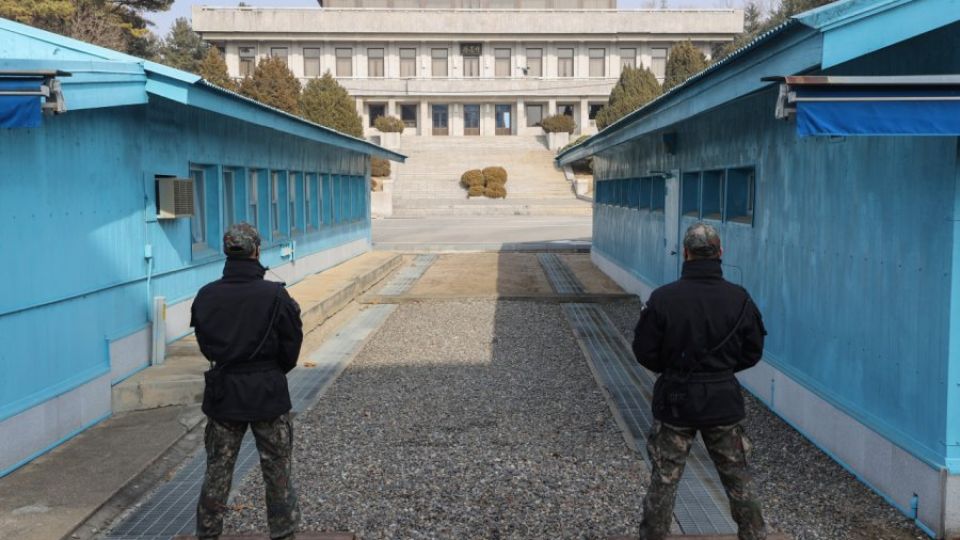February 21, 2023
SEOUL — Panmunjom, the Joint Security Area straddling the military demarcation line separating the two Koreas, was eerily quiet on Tuesday afternoon.
Outsiders seeing the surroundings for the first time were greeted by near-perfect serenity in the place where the two Koreas vowed peace in April 2018. A historic summit that took place two months later in Singapore between then-US President Donald Trump and North Korean leader Kim Jong-un raised hopes for detente that many believed could settle longtime hostilities on the divided peninsula, a Cold War legacy still locked in an armistice following the 1950-53 Korean War.
That never happened. Washington and Pyongyang failed to narrow differences over steps to take between denuclearization and sanctions relief, at their second talks in February 2019. The two countries have since been at odds over reaching any compromise. Undaunted by the impasse, South Korea in the meanwhile had exhausted every tool and opportunity to try to turn the tide. Unsatisfied with intervention, North Korea had looked the other way.
The coronavirus pandemic, which gripped the world in early 2020, made things worse. The health crisis froze even the routine face-to-face meetings between North Korea and the United Nations Command, which handles affairs involving the Demilitarized Zone. The heavily fortified border is a reminder that the war is still technically on, with artillery ready to go off within seconds upon command.
“Once COVID-19 hit, the North’s side was very, very concerned (about infections). They no longer meet with us face-to-face. It’s all via the hotline,” said US Air Force Lt. Col Griff Hofman, the point person with the UNC Military Armistice Commission who led the Feb. 7 media tour, a regular event also disrupted by the pandemic.
In pre-COVID days, North Korean officers would come out to discuss “maintenance of the JSA” with UN officers at one of the three signature blue buildings all sitting across the demarcation line, Hofman said, describing the venue as a testament to inter-Korean reconciliation because of the peace proposals made there, though all exchanges are now on hold.
But verbal exchanges to check on hotlines linking North Korea and the UNC are still taking place twice a day, the UNC officer added, saying the command uses the channel to “pass along messages” to prevent “any surprises” catching North Korea off guard, even if it is as simple as flying a new chopper into the zone.
“One thing the Korean People’s Army does not react well to is surprises,” Hofman said, referring to North Korea’s military. In June 2020, the North caught the South off guard when it destroyed an inter-Korean liaison office, a demolition that took place not far from Panmunjom. Pyongyang had protested anti-North leaflets flying over the border, urging Seoul to hold private citizens taking part in the activity accountable.
Ensuring hostility does not break out again is the first step to “permanent peace on the peninsula,” Hofman stressed, saying the job has been well executed for the last 70 years since July 1953 when the US-led command shook hands on the cease-fire with North Korea on behalf of South Korea. The South also marks 70 years of security ties with the US in October, when the allies agreed on mutual defense against outside attacks.
It seems almost impossible now for South Koreans to revisit the kind of detente they briefly enjoyed in 2018. The resumption of North Korea’s missile firings this week is the latest demonstration of how the trust gap between the two bickering neighbors had grown too wide and deep to fill as they carry on with tit-for-tat shows of force. South Korea, backed by the US and Japan, slapped new sanctions on the North on Monday, calling for a return to talks.
Brinkmanship is increasingly diminishing chances of dialogue. But North Korea had at least shown the resolve to abide by the armistice agreement, so front-line skirmishes do not lead to a spillover, Hofman said, citing a 2017 defection by a North Korean soldier who survived multiple shots from his comrades while making the cross-border dash to South Korea on foot.
The four North Korean soldiers who fired about 40 rounds immediately returned back upon briefly crossing the demarcation line. Crossing the line is prohibited for both Koreas.
That was an indication that North Korea is wary of unnecessary escalation, according to Hofman. “I don’t know what the future holds, but we can only continue to do our jobs as they are assigned to us.”


